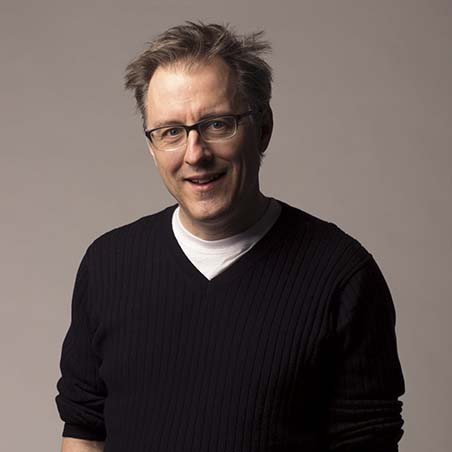John Scott
Documentary Filmmaker
Foundation Year Program, 1987
I can look back at my experience at King’s and say, it’s that experience that made me really want to explore the world.
Each of John D. Scott’s documentary films explores its subject in an unconventional way. In his films, you’ll find the traditional elements of documentary—interviews, narration and archival footage—but you’ll also find imaginative reveries and digressions, blurring the lines between subject, documentarian and viewer. According to John, this is where documentary holds its greatest potential: it enables him to deal with complicated topics in a complex way.
It’s no surprise, then, that John frequently documents the lives of poets in his films. He even takes on the difficult task of representing their poetry on screen. Elizabeth Bishop is the subject of John’s latest feature film, Elizabeth Bishop and the Art of Losing, which premiered at the 2021 FIN Atlantic International Film Festival. Bishop is known for her aversion to revealing personal feelings in her poetry, which instead features her extraordinarily cutting powers of observation and description.
There are other films about Bishop’s life, but in his own film John sought to capture the essence of Bishop’s poetic vision and the core question of her life, rather than re-tell the diverting details of her biography. The film is not a conventional biography of Bishop: it forays into imaginative reenactments of the poet’s childhood in Nova Scotia, cinematic readings of her best-known works and even includes direct speech and questions from John to the long-deceased Bishop. These unorthodox documentary elements give viewers the feeling of seeing through Bishop’s own startlingly clear poetic gaze on topics such as loss, aging and art. John describes his reason for making these kinds of movies, saying “We don’t need documentaries that have a really facile understanding of the world—an understanding that’s superficial, or not looking in depth.”
For John, the impulse to engage critically and imaginatively with his subject matter came from studying the humanities, which he began in 1986 when he enrolled in King’s Foundation Year Program. John’s years at King’s were fruitful ones: he began to study literature, take classes at the Atlantic Filmmakers Cooperative and produce music videos for artists in Halifax’s burgeoning independent music scene. John remarks, “I can look back at my experience at King’s and say, it’s that experience that made me really want to explore the world—both as a maker, but also as somebody who is a reader, and who wants to understand things in a more complex way.”
King’s was also where John encountered the subject of what would become his first feature length film, Scouts are Cancelled. The film is an imaginative biography of John Stiles, a Nova Scotian poet and fellow King’s alumnus who John met when they both played on the university soccer team. John recalls that, in its written form, Stiles’ poetry remained rather obscure to him, but it came to life when the poet read his work out loud. John maintains that the poetry he documents is vital and exciting, rather than an antique form for connoisseurship: “part of my project is to have people appreciate poetry anew, or for the first time, in a way that’s more modern, with an audio-visual component. It’s a medium that’s ripe for our times: it’s short, it’s precise and it’s expressive, and all of that is really well-suited to our current media environment.”
In John’s view, documentary also contains the same kind of transformative machinery that one finds in a good essay, since they both take research and thought and present it in a persuasive and personalized way. As John says, “that’s really what documentary does: you take something, you investigate it, you do research just like a traditional paper, you do interviews and then you create this work that’s hopefully both engaging and has a larger purpose that edifies people, and makes them understand the world in a more complex and interesting way—and [my fascination with] that was really started at King’s College.”
That interrogative instinct continues to impact John’s work as the program director of Ithaca College’s Documentary and Film Production Studies Degree. John was one of the architects of the program’s pedagogical approach and as he explains, its model is similar to experiences John had as an undergraduate student: “it mixes the liberal arts education I got at King’s, my Honours English degree at Dalhousie, and the BFA that I did in film. It takes those ideas and brings them together.” John’s intention is to give students the same experience that he had, where they “get a chance to investigate the world through multiple lenses” as the program “combines journalism, cinema, television, and photography courses, along with traditional liberal arts courses.”
When reflecting on advice he would give to young people curious about filmmaking, John points to his own period of experimentation when he was a student in Halifax.
“There are many ways [to get into filmmaking]. Take a course, take an online tutorial, buy a camera, go out and shoot the squirrels in the park! Just start making projects and thinking about ‘what are the stories I want to tell?’”
Daunting as making one’s first few projects might seem, an experience like the Foundation Year Program is the kind of push that someone might need to think critically and boldly. That was certainly the case for John.
“Of all that time, I think the Foundation Year Program was the program where I learned the most and where I felt the most engaged, and really it’s where I fell in love with university and learning… it was so integrated and interesting, and it opened me up to the world. I actually ended up being a professor, which I never would’ve guessed coming into that program.”
